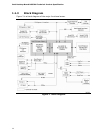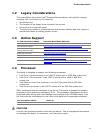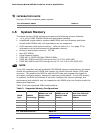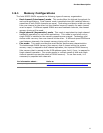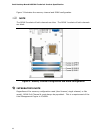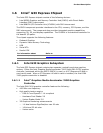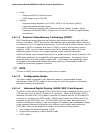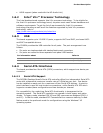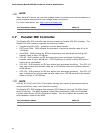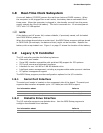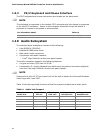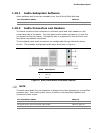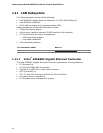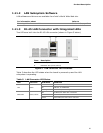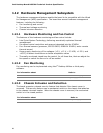
Product Description
21
• HDMI support (when used with the HD Audio Link)
1.6.2 Intel
®
Viiv™ Processor Technology
This Intel desktop board supports Intel Viiv processor technology. To be eligible for
the Intel Viiv processor technology brand, a system must meet certain hardware and
software requirements. To get the list of requirements for Intel Viiv processor
technology branding as well as all the features supported by Intel Viiv processor
technology, refer to
http://www.intel.com/products/viiv/index.htm
1.6.3 USB
The board supports up to 12 USB 2.0 ports, supports UHCI and EHCI, and uses UHCI-
and EHCI-compatible drivers.
The ICH9DH provides the USB controller for all ports. The port arrangement is as
follows:
• Six ports are implemented with stacked back panel connectors
• Six ports are routed to three separate front panel USB headers
For information about Refer to
The location of the USB connectors on the back panel Figure 9, page 41
The location of the front panel USB headers Figure 10, page 42
1.6.4 Serial ATA Interfaces
The board provides four Serial ATA (SATA) connectors, which support one device per
connector.
1.6.4.1 Serial ATA Support
The DG33BU Desktop Board’s Serial ATA controller offers four independent Serial ATA
ports with a theoretical maximum transfer rate of 3 Gbits/sec per port. One device
can be installed on each port for a maximum of four Serial ATA devices. A point-to-
point interface is used for host to device connections, unlike Parallel ATA IDE which
supports a master/slave configuration and two devices per channel.
For compatibility, the underlying Serial ATA functionality is transparent to the
operating system. The Serial ATA controller can operate in both legacy and native
modes. In legacy mode, standard IDE I/O and IRQ resources are assigned (IRQ 14
and 15). In Native mode, standard PCI Conventional bus resource steering is used.
Native mode is the preferred mode for configurations using the Windows* XP
operating system.




